Demolition Contractors Pennsville
Top Demolition Contractors Near Me in Pennsville
Get up to 3 Structure Demolition quotes for your project today! Compare profiles, reviews, accreditations, portfolio, etc... and choose the best service.
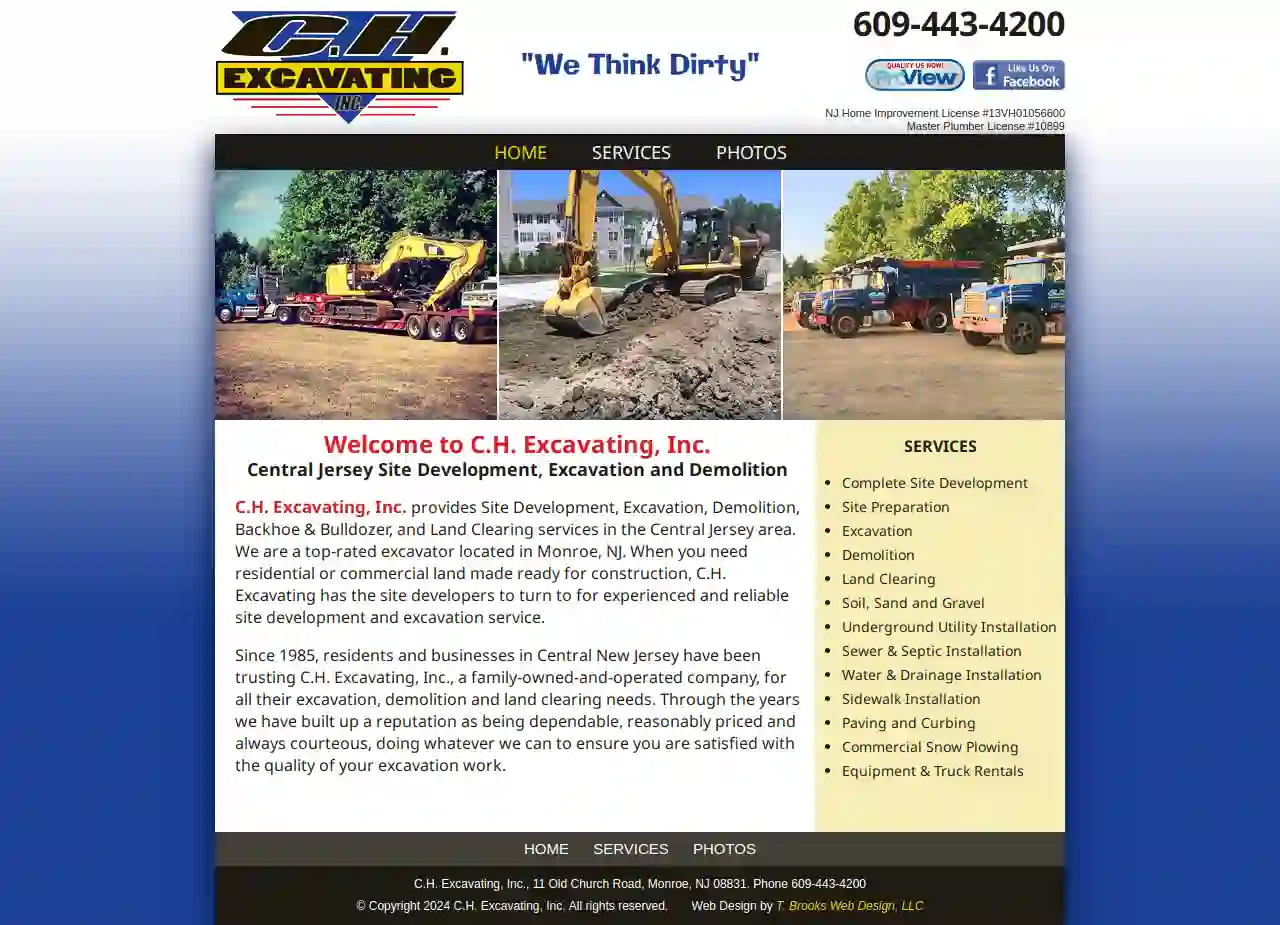
C H Excavating Contractors Inc
53 reviews11 Old Church Road, Monroe, 08831, USWelcome to C.H. Excavating, Inc. Central Jersey Site Development, Excavation and Demolition C.H. Excavating, Inc. provides Site Development, Excavation, Demolition, Backhoe & Bulldozer, and Land Clearing services in the Central Jersey area. We are a top-rated excavator located in Monroe, NJ. When you need residential or commercial land made ready for construction, C.H. Excavating has the site developers to turn to for experienced and reliable site development and excavation service. Since 1985, residents and businesses in Central New Jersey have been trusting C.H. Excavating, Inc., a family-owned-and-operated company, for all their excavation, demolition and land clearing needs. Through the years we have built up a reputation as being dependable, reasonably priced and always courteous, doing whatever we can to ensure you are satisfied with the quality of your excavation work.
- Services
- Why Us?
- Gallery
Get Quote
Torshel Tornado Shelters & Safe Rooms
53 reviewsBrick, USThe fastest way to get your storm shelter is by selecting the product or products of your interest. Then, proceed to fill out the contact form online, and a sales representative will be in touch with you. The installation time for the above and in-ground units is 1-3 weeks, depending on your location. Commercial building installation time is 3-6 weeks, depending on the size and your location. If you are building a house, make sure that you order your storm shelter ahead of time. Thank you very much, stay safe! Financing Options We’ve Been Protecting Families & Businesses For Over 9 Years Buying a storm shelter is an important decision. Torshel is committed to helping you choose the best type of shelter for both your home and budget. Both underground shelters and safe rooms offer maximum protection for storms. We encourage our clients to compare the quality of our shelters, methods of installation, and the reputation of the companies. There have been a few cases where other companies have poorly installed in-ground shelters that slip out of the ground. As a result, people can be terribly injured, and in some cases, death may occur. Some companies put profit over the lives of those who will use their products. At Torshel we work to make sure that we save and help protect as many lives as possible. We only install the highest quality storm shelters available in the market and stand behind our work by offering a 10-year warranty. We make ourselves available before and after the shelter’s installation. Commercial and Residential Storm Shelters Welcome to Torshel Storm Shelters, a leading company in the storm shelter and safe room industry. We have the best products, at an affordable price. We proudly install and serve Alabama, Arkansas, Florida, Kentucky, Louisiana, Mississippi, Tennessee, Texas, Georgia, and surrounding states. However, we sell, and ship storm shelters anywhere in the United States. We have clients in Dallas, New York, Miami, Seattle, Los Angeles, and many rural areas around the country. Enjoy your visit to our website. Take a look at our videos, pictures, and testimonials from multiple clients. We know this is an important decision. Know that if you chose us, you will get great customer service and a top-of-the-line storm shelter backed by a 10-year warranty. Torshel offers discounts to customers who purchase two or more units. Protect your family with a Torshel shelter manufactured to withstand EF5 category tornadoes. Torshel offers underground storm shelters and above-ground safe rooms of various sizes that meet or exceed FEMA’s stringent safety standards. Our tornado shelters are also more durable than traditional storm cellars. Let your neighbors, coworkers, and friends know about your purchase of your storm shelter. If they want to buy one during the same delivery and installation trip, everyone can save a lot. A case in point, Mr. Kyle told Mr. Will about his new in-ground shelter; Will liked the product and decided to purchase one. Torshel delivered and installed two units, and offered them discounts! John and George partnered installing a big shelter in-between their houses, both saved and both of their families can have direct access to the shelter. Commercial Storm Shelters The most valuable asset of any company is not its facilities, machines or products. It’s their team of employees, executives, and clients. Torshel can help protect them while at work with a commercial multipurpose storm shelter, panic room, and safe vault in the event of a tornado, hurricane, robberies, shootings, and other types of incidents that may put in danger their safety. You, your staff, and clients will have a peace of mind by having a steel safe room ready for any threating occasion. Storm Shelter in your Garage Torshel storm shelters are made of structural heavy-duty steel and are one of the bests available in the United States. Our storm shelters are well constructed and properly anchored. Such units will withstand an EF5 tornado according to engineers and professionals at Texas Tech University. They are the perfect solution for the elderly, people with disabilities, claustrophobia, and clients who want an easy to reach safe room in their garage. Inground Tornado Shelters For clients that live in mobile homes, or do not have a garage, we offer underground outdoor shelters. These underground units reflect Torshel’s latest technology. They come with a 13” x 13” bullet-resistant window made of 1.5” polycarbonate. The window allows natural light to flow inside the shelter. You won’t feel entrapped. Torshel’s Newest and High Technology Feature! 4-6 cubic yards of 3,000 PSI concrete will keep the unit inside the ground and prevent it from floating. Let’s Keep Your Family Safe The sooner the better, fill our online form and one of our talented representatives will contact you to help you with any question you might have.
- Services
- Why Us?
- Testimonials
- Gallery
Get Quote
Del Casale Excavating
511 reviews1000 County Route 106, Clifton Park, 12180, USDel Casale Excavating: Your Trusted Partner for Excavation Services Del Casale Excavating is a family-owned and operated business with over 20 years of experience in the excavation industry. We are committed to providing our clients with high-quality, reliable, and affordable services. Our team of experienced professionals is dedicated to exceeding your expectations and delivering exceptional results. We understand that every project is unique, and we take the time to listen to your needs and develop a customized plan that meets your specific requirements. Whether you need site preparation, foundation excavation, utility installation, or any other excavation service, we have the expertise and equipment to handle the job efficiently and effectively. At Del Casale Excavating, we are committed to safety and environmental responsibility. We use the latest technology and equipment to minimize our impact on the environment and ensure the safety of our workers and the public. Contact us today for a free consultation and let us help you bring your project to life.
- Services
- Why Us?
Get Quote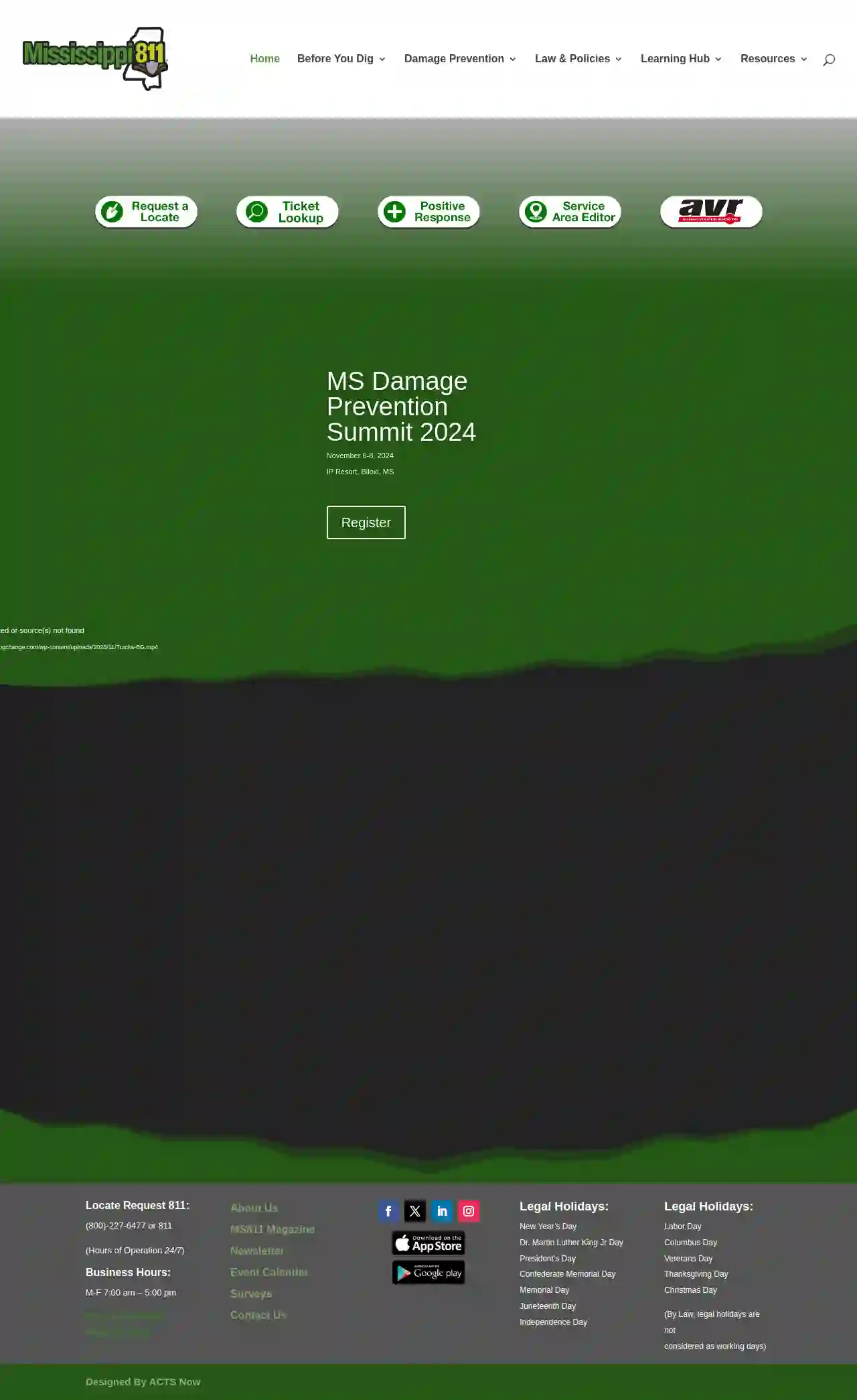
Mississippi 811, Inc.
4.823 reviews200 Country Pl Pkwy, Pearl, 39208, USAbout MS811 MS811 is a vital resource for anyone planning to dig in Mississippi. Our mission is to protect underground infrastructure and ensure the safety of excavators, homeowners, and the public. We provide a free, easy-to-use service that helps you locate underground utilities before you dig. By calling 811 or visiting our website, you can request a locate request and ensure that you are digging safely. We are committed to providing our customers with the highest level of service and support. Our team of experts is available 24/7 to answer your questions and help you navigate the process of digging safely. We also offer a variety of resources and information to help you understand the importance of damage prevention and the laws and regulations that govern excavation in Mississippi. We believe that everyone has a role to play in protecting underground infrastructure. By working together, we can prevent damage to utilities and ensure the safety of our communities.
- Services
- Why Us?
- Gallery
Get Quote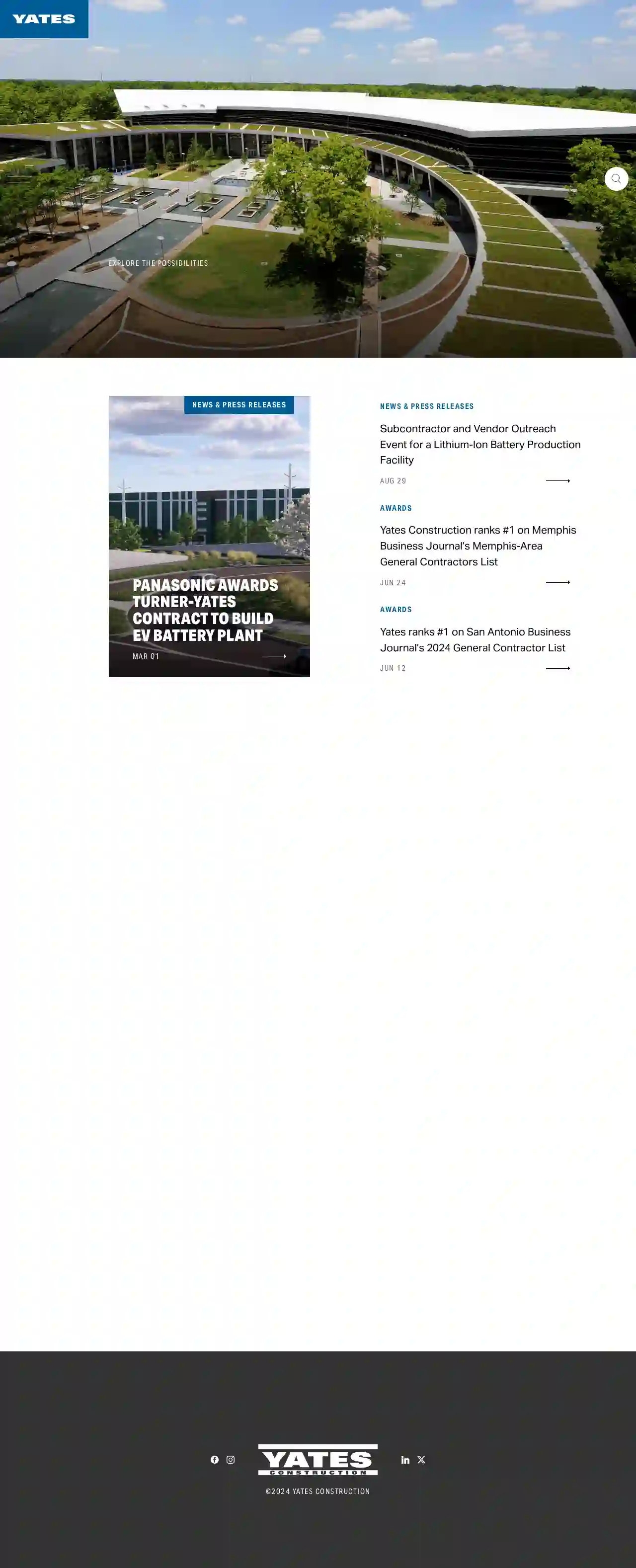
W.G. Yates & Sons Construction Company
4.624 reviews104 Gully Avenue, Philadelphia, MS 39350, 39350, USYates Construction: Building the Future Yates Construction is a leading general contractor specializing in the construction of complex, large-scale projects across the United States. With a rich history spanning decades, we have established a reputation for delivering exceptional results, exceeding client expectations, and fostering lasting relationships. Our Mission Our mission is to provide our clients with the highest quality construction services, delivered on time and within budget. We are committed to safety, integrity, passion, and commitment in everything we do. Our Experience Yates Construction has a proven track record of success in a wide range of market sectors, including: E-Commerce Distribution Facilities Hospitality Gaming Technology Centers Industrial Healthcare Education Government Commercial Our Team Our team of experienced professionals is dedicated to providing our clients with the highest level of service. We are committed to building strong relationships with our clients and subcontractors, and we believe that collaboration is key to success.
- Services
- Why Us?
- Gallery
Get Quote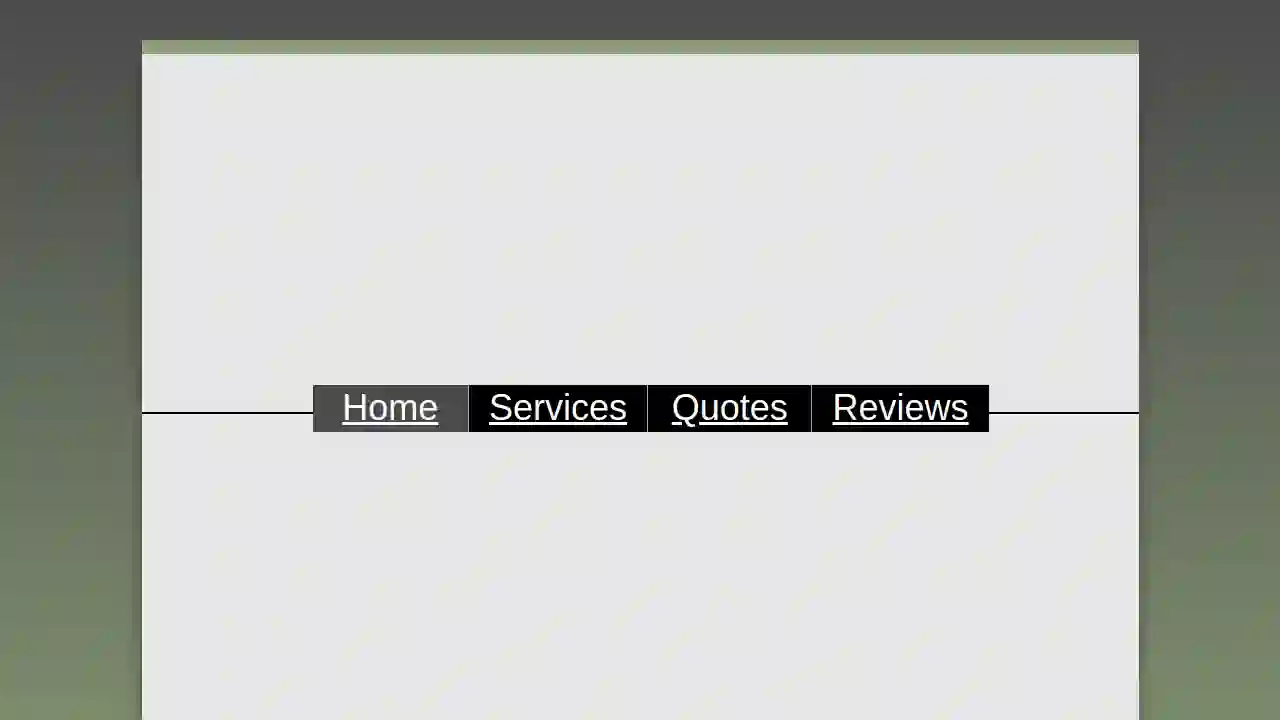
In Earth Excavating & Contracting, Inc
4.36 reviewsWoodbridge, USIn Earth Excavating & Contracting, Inc. In Earth Excavating & Contracting, Inc. is a woman-owned business that is insured, licensed, and certified by the NJDEP. We are also OSHA trained and Roth-certified installers. We specialize in tank installations and tank removal services, as well as tank locating and much more! We offer start-to-finish solutions for every project and also many other services. We also work in collaboration with Frey Engineering for Septic Systems, Geotechnical and Environmental Services. Check out samples of our recent work on our Facebook page, and you'll agree that we're the best choice. Quality Excavation and Contracting Guaranteed: +1.908.246.6891
- Services
- Why Us?
- Our Team
- Testimonials
- Gallery
Get Quote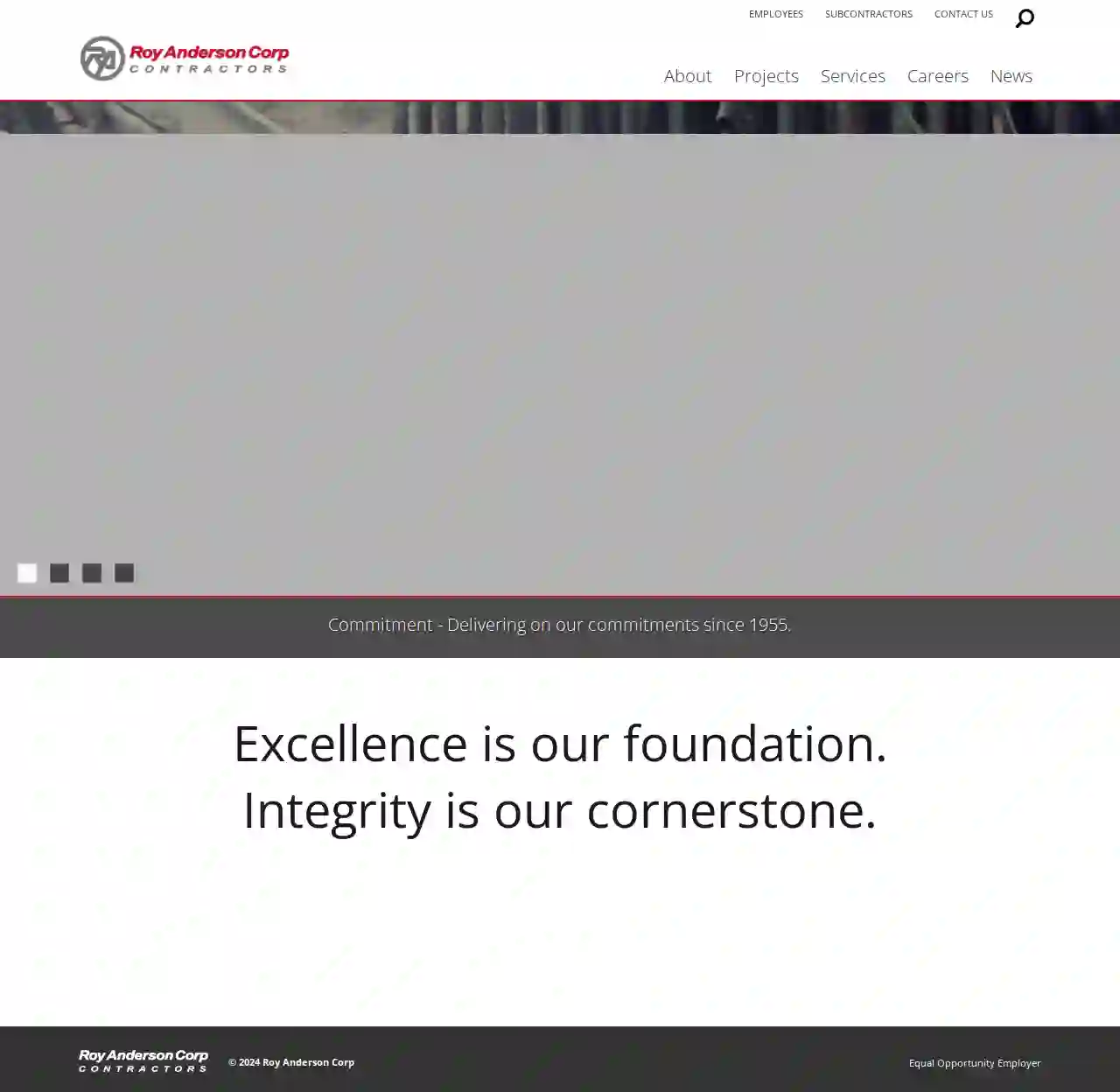
Roy Anderson Corp
4.128 reviews11400 Reichold Road, Gulfport, 39503, USAbout Roy Anderson Corp Roy Anderson Corp is an innovative construction company with unique strengths, committed to delivering unsurpassed customer service and performance to customers, creating exciting opportunities for associates and bound together by shared core beliefs of safety, quality and integrity. Since 1955 Roy Anderson Corp has delivered exceptional construction services including Preconstruction, Design-Build, General Contracting and Construction Management. We are a wholly owned subsidiary of Tutor Perini Corporation (NYSE: TPC) who is consistently ranked among the top builders in the United States by Engineering News Record.
- Services
- Why Us?
- Gallery
Get Quote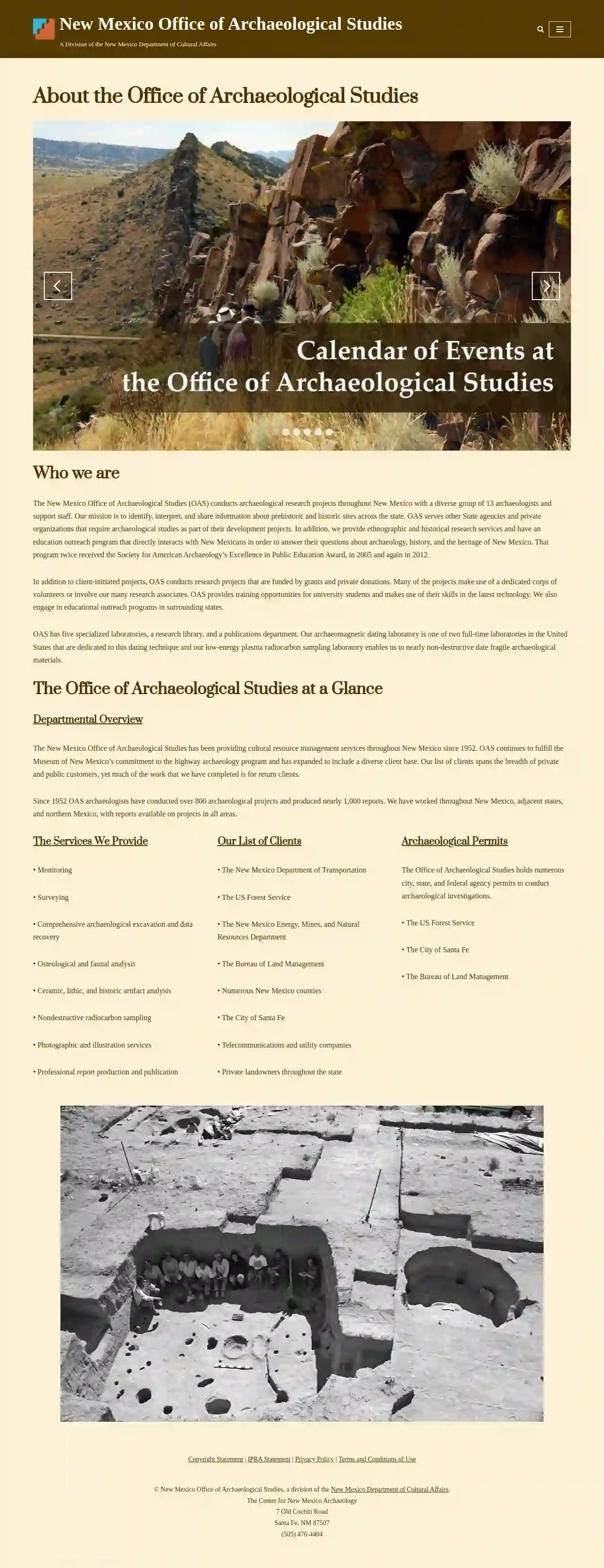
The New Mexico Office of Archaeological Studies
4.312 reviews7 Old Cochiti Road, Santa Fe, 87507, USAbout the Office of Archaeological Studies The New Mexico Office of Archaeological Studies (OAS) conducts archaeological research projects throughout New Mexico with a diverse group of 13 archaeologists and support staff. Our mission is to identify, interpret, and share information about prehistoric and historic sites across the state. OAS serves other State agencies and private organizations that require archaeological studies as part of their development projects. In addition, we provide ethnographic and historical research services and have an education outreach program that directly interacts with New Mexicans in order to answer their questions about archaeology, history, and the heritage of New Mexico. That program twice received the Society for American Archaeology’s Excellence in Public Education Award, in 2005 and again in 2012. In addition to client-initiated projects, OAS conducts research projects that are funded by grants and private donations. Many of the projects make use of a dedicated corps of volunteers or involve our many research associates. OAS provides training opportunities for university students and makes use of their skills in the latest technology. We also engage in educational outreach programs in surrounding states. OAS has five specialized laboratories, a research library, and a publications department. Our archaeomagnetic dating laboratory is one of two full-time laboratories in the United States that are dedicated to this dating technique and our low-energy plasma radiocarbon sampling laboratory enables us to nearly non-destructive date fragile archaeological materials. Departmental Overview The New Mexico Office of Archaeological Studies has been providing cultural resource management services throughout New Mexico since 1952. OAS continues to fulfill the Museum of New Mexico’s commitment to the highway archaeology program and has expanded to include a diverse client base. Our list of clients spans the breadth of private and public customers, yet much of the work that we have completed is for return clients. Since 1952 OAS archaeologists have conducted over 800 archaeological projects and produced nearly 1,000 reports. We have worked throughout New Mexico, adjacent states, and northern Mexico, with reports available on projects in all areas.
- Services
- Why Us?
- Gallery
Get Quote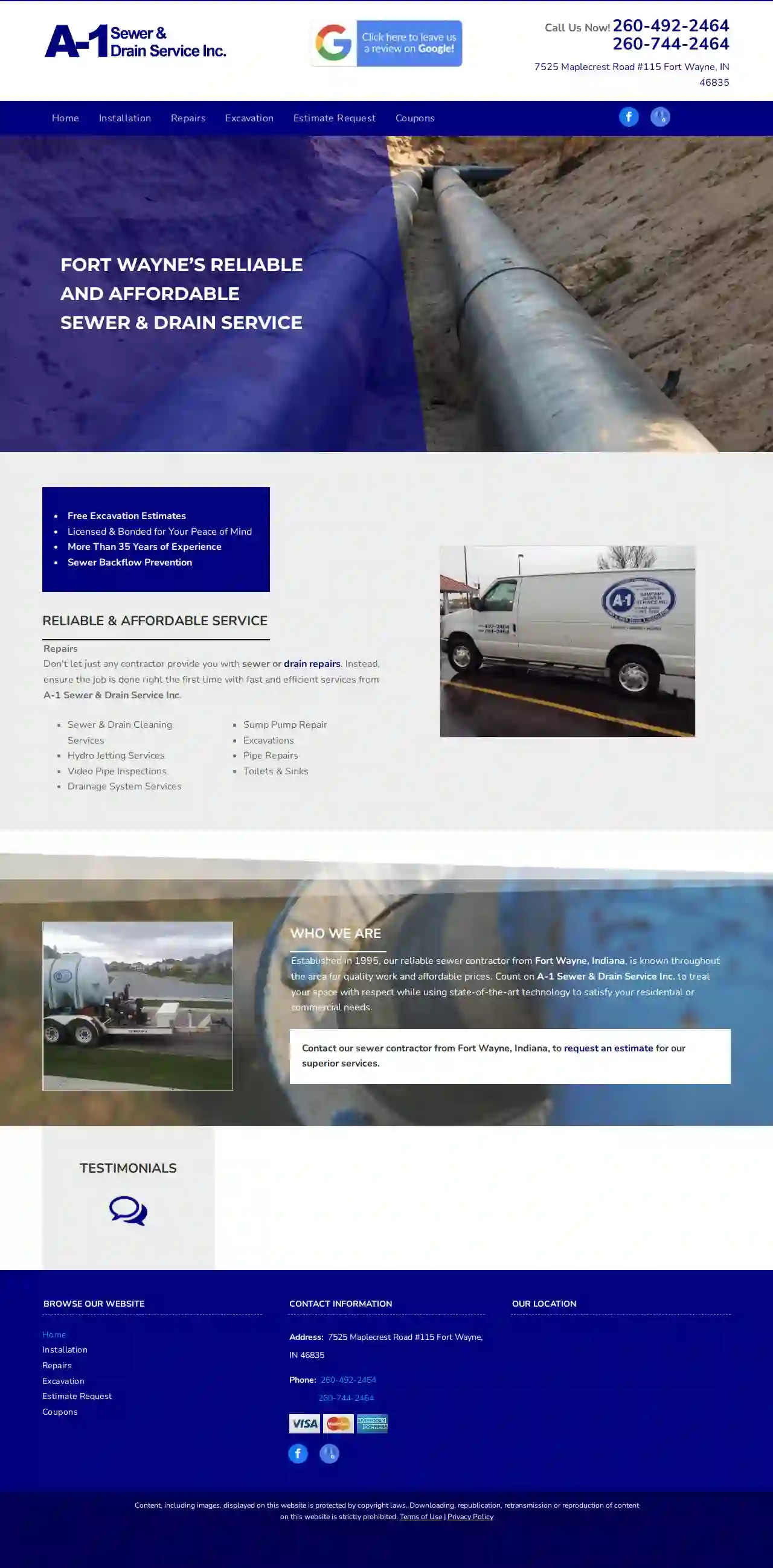
A-1 Sanitary Sewer & Drain Services
4.778 reviews7525 Maplecrest Road, #115, 7525 Maplecrest Road #115, Fort Wayne, 46835, USFORT WAYNE’S RELIABLE AND AFFORDABLE SEWER & DRAIN SERVICE A-1 Sewer & Drain Service Inc. is a trusted sewer and drain contractor serving Fort Wayne, Indiana. Established in 1995, we have over 35 years of experience providing quality services at affordable prices. We are committed to treating your space with respect and using state-of-the-art technology to meet your residential or commercial needs. We are licensed and bonded for your peace of mind. Contact us today for a free excavation estimate.
- Services
- Why Us?
- Testimonials
- Gallery
Get Quote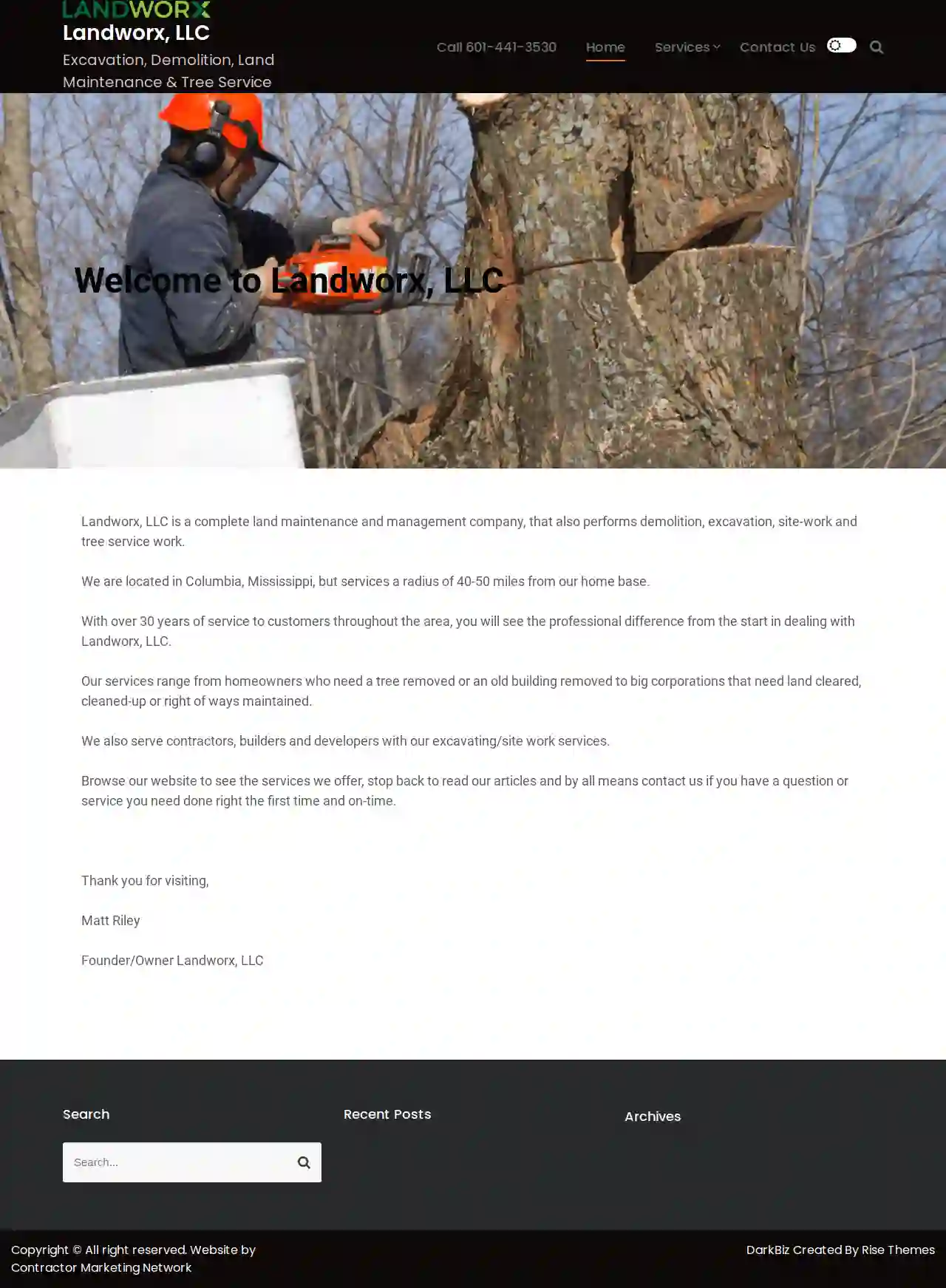
Landworx, LLC
52 reviewsBrick, USWelcome to Landworx, LLC Landworx, LLC is a complete land maintenance and management company, that also performs demolition, excavation, site-work and tree service work. We are located in Columbia, Mississippi, but services a radius of 40-50 miles from our home base. With over 30 years of service to customers throughout the area, you will see the professional difference from the start in dealing with Landworx, LLC. Our services range from homeowners who need a tree removed or an old building removed to big corporations that need land cleared, cleaned-up or right of ways maintained. We also serve contractors, builders and developers with our excavating/site work services. Browse our website to see the services we offer, stop back to read our articles and by all means contact us if you have a question or service you need done right the first time and on-time. Thank you for visiting, Matt Riley Founder/Owner Landworx, LLC
- Services
- Why Us?
- Gallery
Get Quote
Over 22,076+ Excavation Companies registered
Our excavation experts operate in Pennsville and surroundings!
ExcavationHQ has curated and vetted Top Excavation Contractors in Pennsville. Find the most reliable contractor today.
Frequently Asked Questions About Demolition Contractors
- Feasibility Studies: Assessing the viability and challenges of a demolition project.
- Demolition Planning: Developing demolition plans, including method selection, sequencing, and safety procedures.
- Permitting Assistance: Navigating the demolition permitting process and ensuring compliance with regulations.
- Hazardous Material Surveys: Identifying and managing hazardous materials, such as asbestos and lead paint.
- Cost Estimating: Providing accurate cost estimates for demolition services.
- Project Management: Overseeing the demolition process and ensuring it proceeds as planned.
- Site Security: Secure the demolition site with fencing and warning signs to prevent unauthorized access.
- Personal Protective Equipment (PPE): Workers should wear appropriate PPE, including hard hats, safety glasses, gloves, and steel-toe boots.
- Hazardous Material Removal: Properly identify and remove asbestos, lead paint, or other hazardous materials before demolition begins.
- Utility Disconnections: Disconnect all utilities, such as electricity, gas, and water, before demolition.
- Controlled Demolition Techniques: Employ controlled demolition methods to minimize risks and ensure the structure comes down safely.
- Dust Control: Implement dust suppression measures, such as water spraying or misting, to reduce airborne particles and protect air quality.
- Emergency Planning: Have an emergency plan in place, including communication protocols and evacuation procedures, in case of unforeseen events.
What is the difference between demolition and deconstruction?
Demolition: Typically involves bringing down a structure quickly and efficiently, often using heavy machinery and potentially explosives. The primary goal is to clear the site.
Deconstruction: Focuses on carefully dismantling a building piece by piece to salvage reusable materials. It prioritizes minimizing waste and environmental impact, often involving manual labor and specialized tools.
The choice between demolition and deconstruction depends on the project's objectives, budget, and environmental considerations.
What is the role of a demolition consultant?
What are the safety precautions for demolition?
How can I tell if my building contains asbestos?
What is the difference between demolition and deconstruction?
Demolition: Typically involves bringing down a structure quickly and efficiently, often using heavy machinery and potentially explosives. The primary goal is to clear the site.
Deconstruction: Focuses on carefully dismantling a building piece by piece to salvage reusable materials. It prioritizes minimizing waste and environmental impact, often involving manual labor and specialized tools.
The choice between demolition and deconstruction depends on the project's objectives, budget, and environmental considerations.
What is the role of a demolition consultant?
- Feasibility Studies: Assessing the viability and challenges of a demolition project.
- Demolition Planning: Developing demolition plans, including method selection, sequencing, and safety procedures.
- Permitting Assistance: Navigating the demolition permitting process and ensuring compliance with regulations.
- Hazardous Material Surveys: Identifying and managing hazardous materials, such as asbestos and lead paint.
- Cost Estimating: Providing accurate cost estimates for demolition services.
- Project Management: Overseeing the demolition process and ensuring it proceeds as planned.
What are the safety precautions for demolition?
- Site Security: Secure the demolition site with fencing and warning signs to prevent unauthorized access.
- Personal Protective Equipment (PPE): Workers should wear appropriate PPE, including hard hats, safety glasses, gloves, and steel-toe boots.
- Hazardous Material Removal: Properly identify and remove asbestos, lead paint, or other hazardous materials before demolition begins.
- Utility Disconnections: Disconnect all utilities, such as electricity, gas, and water, before demolition.
- Controlled Demolition Techniques: Employ controlled demolition methods to minimize risks and ensure the structure comes down safely.
- Dust Control: Implement dust suppression measures, such as water spraying or misting, to reduce airborne particles and protect air quality.
- Emergency Planning: Have an emergency plan in place, including communication protocols and evacuation procedures, in case of unforeseen events.